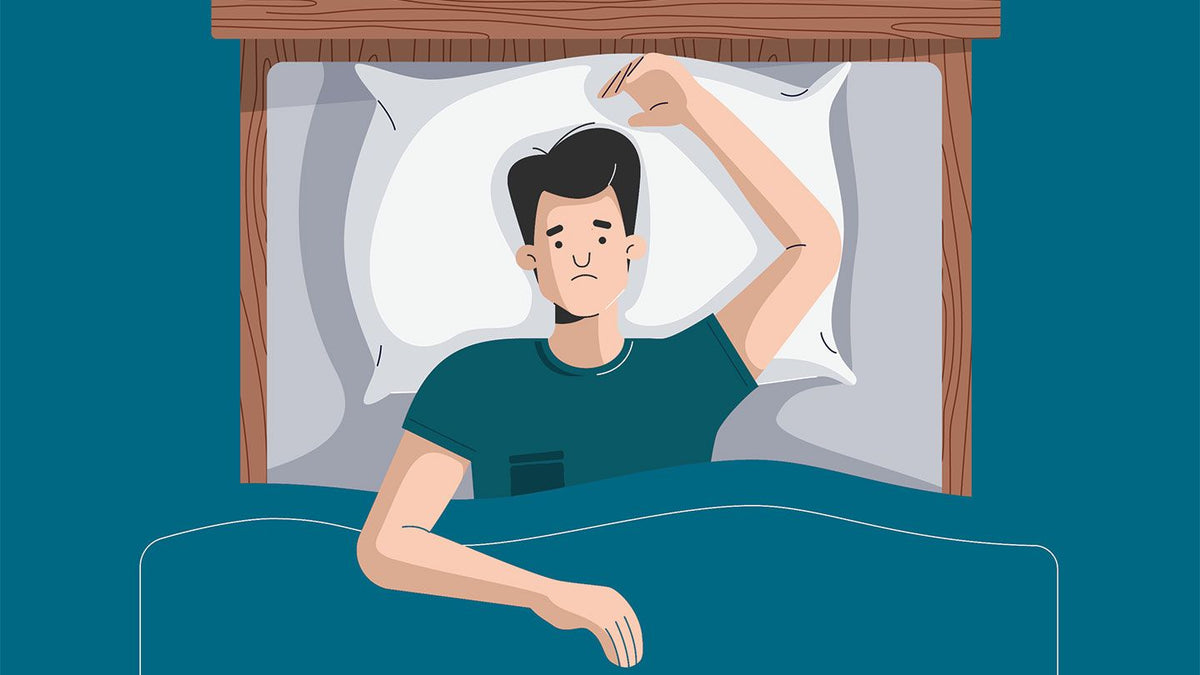Here's How You Can Overcome Insomnia
Sep 15, 21

You've probably had times where no matter how hard you tried; you couldn't sleep.
Insomnia is defined as difficulty in falling asleep, staying asleep, or both. Insomnia is one of the most common sleeping disorders. Short-term (acute) insomnia refers to episodes of sleeplessness that last only a few days. Whereas Ongoing (chronic) insomnia is when you have persistent sleep problems.
Insomnia has a variety of effects on people. You may not be able to fall asleep or stay asleep if you have it. You may find yourself waking up sooner than you would want, possibly in the early hours of the morning, and unable to fall back asleep.
The causes of insomnia
At some point in their life, everyone has problems sleeping or staying asleep. Due to work, family, and constant access to technology, most people do not get enough sleep. Other culprits include:
- Changes in environment or work schedule.
- Disrupted sleep schedule.
- Significant stress, anxiety or depression.
- Illness.
- Medications.
- Medical conditions.
- Physical discomfort.
How is insomnia diagnosed?
The process of a diagnosis includes:
- Your sleep history. Prepare to describe your insomnia in detail, including how long it's been going on, what you think is causing it, and how you sleep, including barely falling asleep or waking up too early.
- Your health history. Your doctor will evaluate any health concerns, medicines you're taking, and stressful life circumstances that could be affecting insomnia.
- Physical exam. The doctor will investigate any physical issues that may be causing sleep issues.
- Sleep study. You'll need a sleep study at a sleep lab, where researchers will monitor your sleep.
Sometimes Lifestyle Changes Alone Can Help with Insomnia
- Staying away from anything that can interfere with your ability to fall asleep This includes substances such as caffeine and tobacco, which can linger in your system for up to eight hours. Also, don't rely on a nightcap to get you through the night. Some individuals believe that drinking alcohol helps them fall asleep faster, but it actually disrupts their sleep.
- Exercising at a Time That Isn't Too Late If you go to the gym more than three hours before night, your body will be stimulated, making it more difficult to fall asleep.
- Restricting Naps in Daytime to not more than 30 Minutes
Cognitive Behavioral Therapy Is the Gold Standard for Treating Chronic Insomnia
If improved sleep hygiene and other lifestyle modifications aren't enough to enhance sleep and reverse persistent insomnia, cognitive behavioral therapy is the next step. It's a better alternative to taking medication.
This continuous therapy's purpose is to assist you in changing your sleep-related beliefs, routines, schedules, and behaviors. For example, you may need to break your habit of using your bed for activities like laptop work.
CBT also includes regular follow-up sessions with a behavioral sleep medicine specialist. This therapist may also:
- Have you keep a sleep diary
- Examine your sleeping and waking routines to determine what is keeping you from getting a good night's sleep.
- Teach you proper sleeping habits and relaxing strategies.
Taking Sleep Aids
If you try sleep hygiene and cognitive behavioral therapy for insomnia, and you’re not seeing the benefit, we would advise you to see a specialist so They can rule out any other medical or mental health conditions that could be causing your sleeplessness and point you in the right direction for therapy.
You might wish to discuss using an over-the-counter sleep aid with your sleeping doctor. Sleep aids operate by turning on the brain's sleep centers while turning off the wake centers. However, you must exercise caution. People begin to believe that in order to sleep at night, they must grab for something. When this happens, medicine might turn an acute problem into a chronic one.
In most cases, over-the-counter or prescription sleep medication can be helpful if used for a short period of time, as you simultaneously establish a healthier sleep routine by improving your sleep hygiene and developing routines that allow you to obtain the rest you require are essential.
However, if your sleep aid doesn't work, and causes more harm than good, or you're concerned about persistent insomnia and other symptoms, consult your doctor.
Can My Insomnia Be Cured?
Absolutely. It won't be easy, though, because treating insomnia generally necessitates bettering your sleep hygiene and forming sleep-friendly habits. And habits, particularly daily routines, can be difficult to break.
But it is possible. Each small step you take to establish better sleep is an important one.
We think people underestimate how much making small changes to their habits can be beneficial. Even though changing those behaviors can be difficult, doing so gradually over time can greatly enhance someone's sleep.
And this is where you might need us, Morpheus Healthcare has been providing quality clinical services for Sleep & Respiratory Care since 2013. So, the next time your friend asks you, “Do you know about any sleep consultant in Delhi or Sleep Centre near me?”, you’ll know where to point them. Contact us for further details regarding our services.

